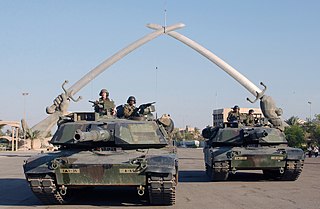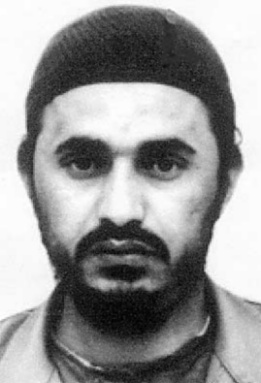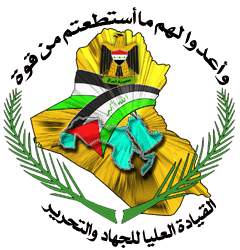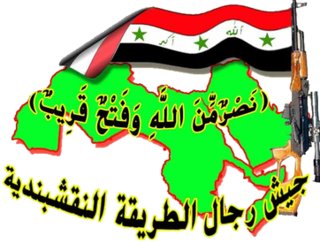
The following is a timeline of major events during the Iraq War, following the 2003 invasion of Iraq.

Baqubah is the capital of Iraq's Diyala Governorate. The city is located some 50 km (31 mi) to the northeast of Baghdad, on the Diyala River. In 2003 it had an estimated population of some 280,000 people.

Ayad Allawi is an Iraqi politician. He served as the vice president of Iraq from 2014 to 2015 and 2016 to 2018. Previously he was interim prime minister of Iraq from 2004 to 2005 and the president of the Governing Council of Iraq in 2003.

Al-Iskandariya or Alexandria is an ancient city in central Iraq, one of a number of towns in the Near East founded by and named after Alexander the Great. It is a majority Shia Arab district including Musayyib and Jurf Al Sakhr. The district capital is located about 70 kilometres (45 mi) south of Baghdad, near the Euphrates River.

Jama'at al-Tawhid wal-Jihad, abbreviated as JTJ or Jama'at, was a Salafi jihadist militant group. It was founded in Jordan in 1999, and was led by Jordanian national Abu Musab al-Zarqawi for the entirety of its existence. During the Iraqi insurgency (2003–11), the group became a decentralized network with foreign fighters with a considerable Iraqi membership.

An Iraqi insurgency began shortly after the 2003 American invasion deposed longtime leader Saddam Hussein. It is considered to have lasted until the end of the Iraq War and U.S. withdrawal in 2011. It was followed by a renewed insurgency.

After the 2003 invasion of Iraq was completed and the regime of Saddam Hussein was toppled in May 2003, an Iraqi insurgency began that would last until the United States left in 2011. The 2003–2006 phase of the Iraqi insurgency lasted until early 2006, when it escalated from an insurgency to a Sunni-Shia civil war, which became the most violent phase of the Iraq War.

The Islamic Army in Iraq was an underground Islamist militant organization formed in Iraq following the 2003 invasion of Iraq by U.S.-led Coalition forces, and the subsequent collapse of the Ba'athist regime headed by Saddam Hussein. IAI was regarded as one of the largest, sophisticated and most influential Sunni insurgent groups in Iraq that led an asymmetrical military insurgency against Coalition forces. The group became known for its grisly videos of kidnappings and attacks on U.S. and Iraqi troops.
Events in the year 2005 in Iraq.

The 1920 Revolution Brigades was a Sunni militant group in Iraq, which included former members of the disbanded Iraqi army. It was established by the members of the former Ba'ath army of Saddam Hussein in 2003 following the American invasion. The group had used improvised explosive devices, and armed attacks against U.S.-led Coalition forces and comprises the military wing of the Islamic Resistance Movement. The group was named in reference to the Iraqi revolt of 1920.
Misha'an al-Juburi is an Iraqi politician from the Sunni Arab community and member of Al-Arabiya Coalition. He also was the head of Reconciliation and Liberation Bloc, which held three seats in the Iraqi Council of Representatives from 2005 to 2010. Juburi is the publisher of the al-Itijah al-Akhar newspaper and the owner of the Syrian-based Arrai TV. He is a leader of the Al-Jiburi|Jiburi clan, which is powerful in Salah ad Din Governorate. As of 2016, he is a senior member of a parliamentary committee investigating official corruption.
The term militia in contemporary Iraq refers to armed groups that fight on behalf of or as part of the Iraqi government, the Mahdi Army and Badr Organization being two of the biggest. Many predate the overthrow of Saddam Hussein, but some have emerged since, such as the Facilities Protection Service. The 2003 invasion of Iraq by United States-led forces undermined the internal order in the country and brought about, among other things, the establishment of several pro-Iranian militias affiliated with the Islamic Revolutionary Guard Corps's Quds Force. The militias were set up with the purpose of driving the U.S. and Coalition forces out of Iraq and establishing Iranian involvement in the country. Prominent among the militias are Asa'ib Ahl al-Haq, Kata'ib Hezbollah and Harakat al-Nujaba.

Abu Musab al-Zarqawi, born Ahmad Fadeel al-Nazal al-Khalayleh, was a Jordanian jihadist who ran a terrorist training camp in Afghanistan. He became known after going to Iraq and being responsible for a series of bombings, beheadings, and attacks during the Iraq War, reportedly "turning an insurgency against US troops" in Iraq "into a Shia–Sunni civil war". He was sometimes known by his supporters as the "Sheikh of the slaughterers".

The Supreme Command for Jihad and Liberation is an Iraqi front comprising some 23 militia groups formed in October 2007 and were led by former Iraqi vice president and deputy chairman of the Revolutionary Command Council Izzat Ibrahim al-Douri. The name is also often used to refer to the largest militia in the front, the Army of the Men of the Naqshbandi Order, which was commanded by Douri himself.
The Battle of Karbala was fought during the 1991 uprisings in Iraq which followed the Gulf War. The battle started after demoralized troops throughout Iraq began to rebel against Saddam Hussein. From 5 to 19 March 1991, the city of Karbala became a chaotic battlefield as the result of bitter fighting between the insurgents and the Iraqi Republican Guard. After the failure of the uprising, citizens were killed in large numbers. Parts of the city were nearly leveled.
The mass media in Iraq includes print, radio, television, and online services. Iraq became the first Arab country to broadcast from a TV station, in 1954. As of 2020, more than 100 radio stations and 150 television stations were broadcasting to Iraq in Arabic, English, Kurdish, Turkmen, and Neo-Aramaic.

The combatants of the Iraq War include the Multinational Force in Iraq and armed Iraqi insurgent groups. Below is a list of armed groups or combatants that participated in the Iraq War of 2003–2011.

The Army of the Men of the Naqshbandi Order (Arabic: جيش رجال الطريقة النقشبندية Jaysh Rijāl aṭ-Ṭarīqa an-Naqshabandiya), (JRTN) also called the Naqshbandi Army, is one of a number of underground Ba'athist militant insurgency groups fighting U.S.-led Coalition forces in Iraq. Media frequently refers to the group by the initials JRTN, a romanization of its Arabic name. Supreme Command for Jihad and Liberation, technically the name of the umbrella organisation to which JRTN belongs, is also often used to refer to JRTN specifically.

The Iraqi conflict is a series of violent events that began with the 2003 American-led invasion of Iraq and deposition of Iraqi president Saddam Hussein, the most recent of which is the ISIS conflict, in which the Iraqi government declared victory in 2017.














